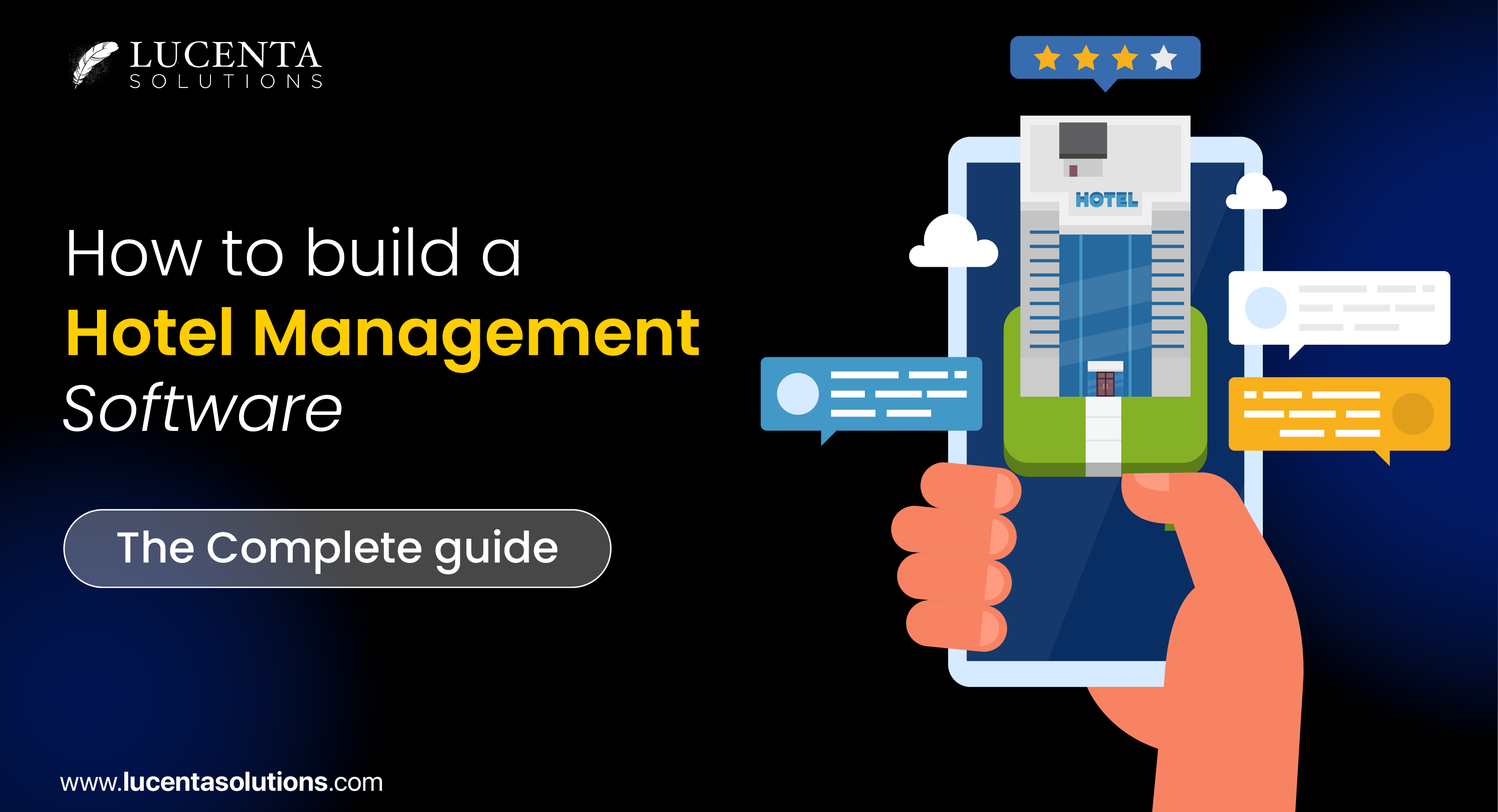Complete Guide to Building a Hotel Management Software
Imagine a situation where the receptionist of a hotel is facing multiple requests from guests. This situation can be overwhelming to solve the queries of every guest manually. Moreover, if the hotel is still using spreadsheets and registers, then it can be time-consuming. To run the hotel management system successfully, every area of the operation, including reservations to check-ins, needs to be aligned well. However, in some cases, it can take time to meet requirements and manage operations seamlessly. This is where the hotel management software system comes into play.
Using the versatile management software, hotel owners and representatives can automate routine operations, manage bookings & property, and increase staff productivity. However, building a hotel booking management software requires some understanding and the proper steps. In this guide, we break down the importance of software for hotel management, steps to build one, and other aspects.
Why do you need Hotel Management Computer Software?
Post-COVID-19 era, the hospitality industry witnessed solid growth. According to Statista, the global hospitality industry is set to reach $5.5 trillion market by the end of 2024. This growth has pushed hotel owners to invest more in systems that can help manage customers and offer better service. Here’s why hoteliers are adopting hotel management software systems-
Flawless Operations
Consider yourself running a hotel having 15 rooms for accommodation in a bustling tourist location. The average per night rate for a room could be around $400, and the average revenue per day could be around $6000 for full occupancy. You might want to increase the revenue. But couldn’t! Why? This is because you are spending much of your time booking reservations, handling multiple guests at a time, and being unable to manage the operation. Your average revenue will be affected. Guests need quick and flawless service. Many guests would book a room on the counter. In this case, you cannot keep doing things manually. With hotel booking management software, half of your stress comes down, as it will handle all aspects of your booking.
Improved Communication
Effective communication is a fundamental necessity in the hospitality sector. Employees must communicate not only with one another but also with guests and personnel of other departments. One of the benefits of custom software is having a simple way to transmit information via a centralized database, allowing staff members to view guest details such as preferences and reservation details. This enables personnel to provide excellent service and guarantees that visitors will ultimately be content and satisfied.
Security & Privacy Measures
A large hotel is home to a variety of individuals working as staff. It has visitors as well as employees from multiple departments. Security and data privacy are, therefore, crucial. In addition, a hotel setting may experience numerous problems due to data loss.
One classic example is the 2018 Marriott hotel breach, where hackers attempted to gain access to guest reservation data of Starwood Hotels & Resorts. There was a previous breach of the data of Starwood before it was acquired by Marriott.
Investing in hotel property management software helps keep data secure. This guarantees that all system data is protected against loss and that guest information is kept safe. Above all, privacy and security precautions provide a safe and comfortable atmosphere for employees and clients.
Better Financial Management
Expense tracking, billing, and invoicing are a few of the regular financial processes in the hotel business. Depending on how large your hotel is, managing finances can be challenging. Investing in hotel revenue management software can automate the task of creating invoices, keeping track of payments, and reminding people that making payments is made possible by hotel management software. This reduces the possibility of billing problems, overcharging or undercharging, and billing delays.
Step-by-Step Guide to Building Hotel Management Software System
Investing in hotel management computer software is a good idea for your hotel business to bring in manual work and increase the hotel’s revenue. HMS makes it possible to automate routine management and employee duties while gathering data on every facet of the company and compiling it into reports. Time and effort savings, income growth, improved visitor experience, and increased loyalty are the goals of all of this. Let us tour you through this step-by-step guide to building software for hotel management:
Defining your Requirement
Defining the requirements of your hotel is the very first step in building hotel management software. It helps you to know the cost of software development and keeps the project on track. This process involves understanding the pain points of your guests and hotel staff. Similar high-core features include room management, reservations, revenue management, and front desk operations.
Features and Tools Selection
The second step in creating hotel management software is selecting features that closely align with your hotel needs and maximize differentiation. This should involve organizing reservations, linking your point-of-sale system, automating housekeeping, or providing verbal exchange choices for visitors.
Arrange the skills according to importance and complexity. Subsequently, the companies offering hotel booking software development services will provide frameworks and programming languages based on your needs, budget, and desired level of customization. Identify existing systems, including PMS, CRM, and payment gateways, that will be needed for integration purposes.
Building a Strong Development Team
When it comes to building a solid development team, you have two options – outsourcing or hiring the team. The core development team consists of a project manager, software developers, database administrators, and a UI/UX Design team. It is essential to develop a team that has proficiency with upgraded tech stacks like Java, Python, NET, SQL, and others.
Architecting Scalable and Secure Systems
When it comes to developing hotel management software, both scalability and security matter the most. Scalable architecture helps you handle increasing user demand without compromising performance. Security, on the other hand, protects the software against any third-party breach. The process involves developing a user-friendly interface for staff and guests for easy use.
Develop and Test
In this step, adopt an iterative approach that can help in developing the software and design it accordingly. Using the right technology stack, you can build software that meets business and end users’ needs. Upon completion of the development stage, apply rigorous testing to ensure bugs are fixed for better performance. This step also involves data migration from the legacy system to the software.
Implement and Optimize
Once the development and testing are complete, implement or launch the software. This is also where you need to optimize the software as per the feedback from guests and staff you get. You need to provide hands-on training to your staff to use the software. The software development company you hired for the work will offer technical support and gather feedback for further improvement.
Note- For a hotel management computer software to run smoothly, it is essential to keep optimizing it regularly.
Essential Features to Look for in Hotel Management Software Systems
Using hotel management software can increase revenue and productivity for independent businesses. The comprehensive aspect of a system that collaborates to provide the finest business results is what gives it power.
By using the software system, hoteliers can streamline the process and manage different aspects of the business. However, it is essential to ensure that the software carries features for smooth functioning. Some of these are-
Cloud-Based
One of the essential features the software should carry is the cloud-based system. The technology behind cloud computing is quick, scalable, and inexpensive. Compared to a system that requires costly physical changes, it is also far simpler to update regularly. You don’t need to be physically present at your site to monitor your business operations because cloud-based HMS may be viewed from any location with an internet connection.
Integrated Booking System
The hotel booking management software must carry a seamless booking method. From checking out the reservation to booking the same, the system should make things simple. You have far more flexibility to cater to various guests for easy direct booking. Sync the reservations placed on your website with your hotel property management system to prevent overbooking.
Managing Finance
When a hotel has regular bookings, the revenue keeps on increasing. The hotel revenue management software should have the feature to manage and keep track of finances. It is one of the types of software hotels invest in and helps in controlling the revenue daily.
Creating Detailed Reports
There is a huge chunk of data collected in the hotel industry. Independent hotels can use data to make informed decisions and provide detailed reports that give insight into daily operations, financials, analytics, and other aspects of their establishment. The hotel management computer software comes with an option to filter by marketing channel, room type, and other essential characteristics; dynamic reporting modules allow building reports to be viewed in-browser, as emails, or as downloadable spreadsheets and PDFs.
Point of Sale Integration
The software should carry the feature to integrate with on-site purchases including restaurant bills, spa services, etc. This point-of-sale integration helps in offering better service and freeing up the staff from work burden.
Wrapping it up
The hotel property management software is the best tool developed in the hospitality sector. It automates essential processes, administrative work, revenue, and operations. If you are keen to switch to an advanced hotel management software system and looking for a team to handle the job, Lucenta Solutions is the right choice.
Lucenta Solutions is the leading software development company, having collaborated with leading chains of hotels for software development. The team collaborates to understand your needs, helping to maximize your revenue and automate daily hotel work.




